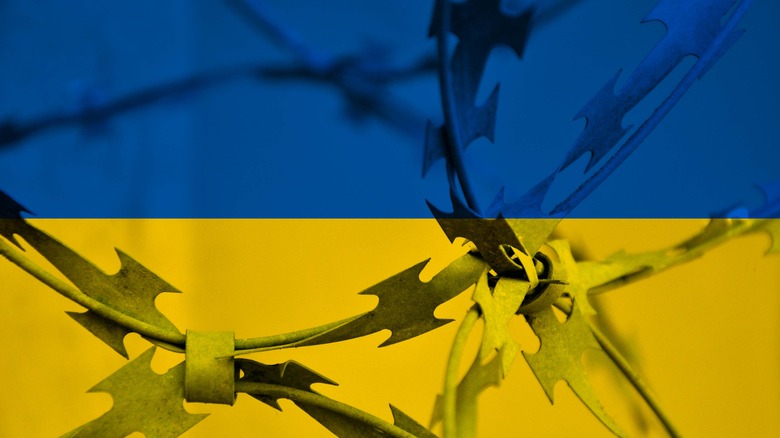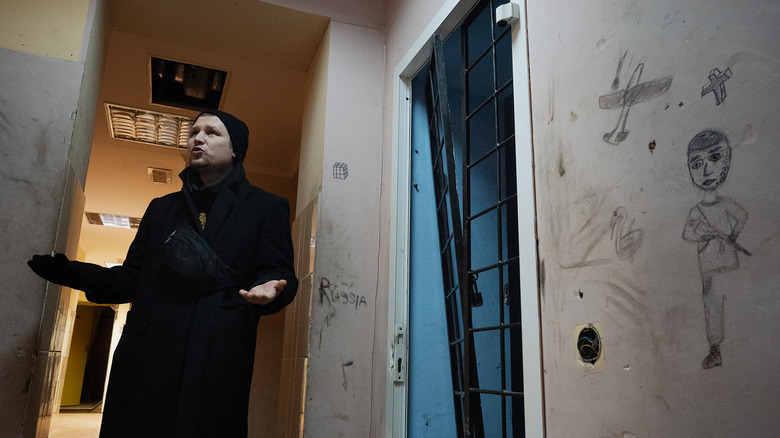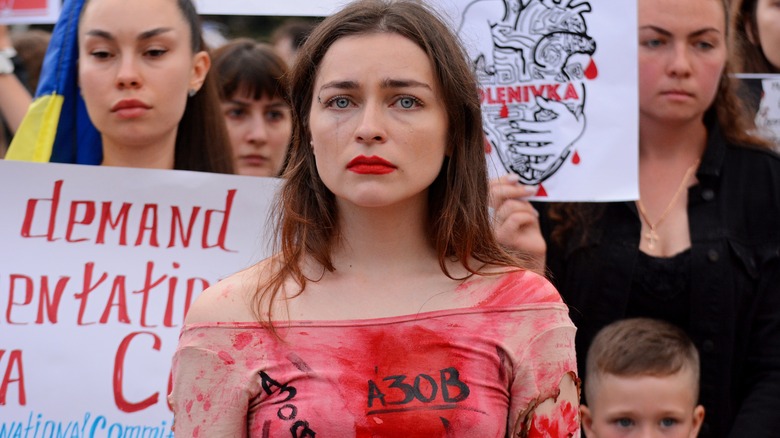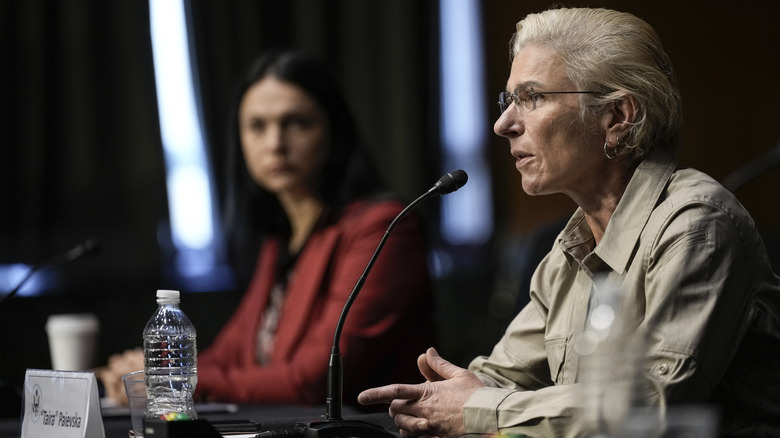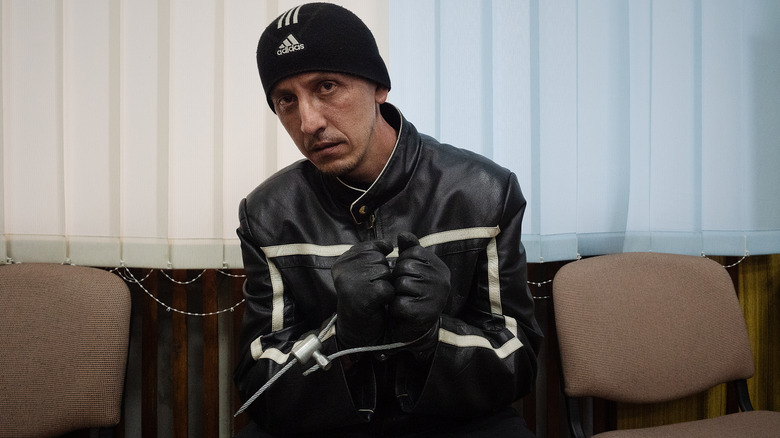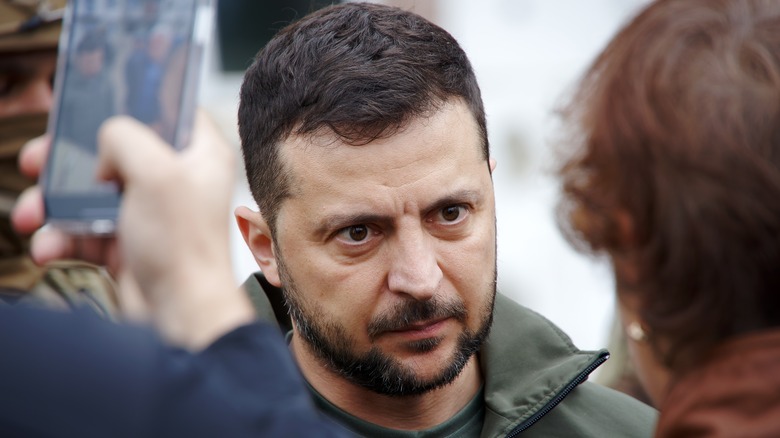Inside Russia's Terrifying POW Camps In Ukraine
Note: The following article contains descriptions of torture and physical abuse.
When Russia invaded Ukraine in February, 2022, voices cried out, "Ukraine will be bulldozed in a week," "Ukraine and its people will triumph," "Putin is a bloodthirsty lunatic," "Putin has his reasons," and everything in between. Then the Ukrainians dug in, shocked the globe with a tenacity bordering on miraculous, and President Volodymyr Zelenskyy — a comedian new to politics when he became president in 2019 — rose up to become the globe's icon of defiance. Every minute of every day since then, while the rest of the world moves on to other happenings, Ukraine has faced down the giant and its bombs and bullets, and even recently regained territory equaling 8,000 square kilometers (3,088 square miles), as CNBC reports in detail.
And yet, the overall outcome of the war remains unpredictable. Fox News postulates that Ukraine will ultimately lose a "war of attrition" unless world leaders like President Biden provide more support in terms of bigger and better weapons like U.S. Army Tactical Missile Systems. Sites like The Conversation agree. Outlets like Vox, though, take a more ambiguous approach and describe how Russia's military strategies and weaponry are generations behind. Meanwhile, back in Russia, the pro-war state propaganda machine blares loudly, as the BBC depicts. Across the board, discussions have turned from "Why is the war happening?" to "What will happen?"
Recent developments, however, paint the Russian military as the maniacal, absolute villain that many believed it to be. Torture prisons have taken root in Russian-occupied Ukrainian territory.
Walls of suffering for Ukrainian prisoners
Many recent facts about Russian torture of Ukrainian prisoners come following Ukraine's retaking of the city of Izyum in the eastern part of the country. (Please bear in mind: readers should exercise caution from here out.)
One 67-year-old man on the BBC, Mykhailo Ivanovych, describes the litany of torture that he and other prisoners endured while in Russian custody for 12 days: electrocution by connecting wires to his fingertips, beatings, interrogations and bright lights, broken bones and long needles driven beneath the skin of his back, and more. He describes soldiers holding his arm while other soldiers smashed it repeatedly with a pipe until he completely lost feeling in the limb. Soldiers came into his cell in the bottom of a bombed-out police station two or three times a day to pull out him and his fellow prisoners one at a time. The cells was stuffed with grimy clothes and mattresses, and at one point he believed one of his companions was already dead when carried away.
This is only one such location. On WHYY, a joint collaboration between PBS and NPR, President Zelenskyy describes at least 10 such concealed "torture chambers" discovered since September 11. All of them are similar in appearance: small, filthy, and full of tools of torture. Even though many other people besides Ivanovych have come forward, numbers are still being tallied, and it's impossible to completely assess at this point what are, blatantly, war crimes.
Months and months of incessant war crimes
Even though stories of Russian torture of Ukrainian prisoners are coming to light, now that captured areas have been reclaimed, sources reported human rights abuses by the Russian military back to the very beginning of the war. By May 18, less than three months into the war, Human Rights Watch published a report describing undeniable crimes against humanity and war crimes committed by Russian soldiers. These crimes violate precedent established by the Geneva Conventions of 1949, the First Additional Protocol to the Geneva Conventions, and accepted conduct regarding international conflicts, as the International Committee of the Red Cross lays out.
The report by Human Rights Watch details an exhaustive list of torture committed by the Russian military against hundreds of individuals in occupied territory. People were tied up and imprisoned in cells without food or water, and developed high fevers, spastic coughs, and vomiting. This includes infants and elderly people, many of whom died. Prisoners were kept in blindfolds; mock executions were utilized to terrify people; the dead were tossed into mass graves.
On the night of March 30, Anastasia Andriivna came home to find her son. "He was lying there in a fetal position, with his hands tucked under his head, and his jacket draped over his shoulders. He had been shot in the ear, with blood covering his face. His best friend [Volodymyr Pozharnikov] was lying next to him; he had also been shot. His legs were bent in an unnatural position."
Ongoing reports by human rights organizations
By now, numerous outlets have published stories about Russia's war crimes, and many surviving victims have come forward. Accounts on Euronews, the BBC, The Guardian, PBS, and more all tell the same story: electric generators delivering higher and higher voltage through the bodies of the captured; graves full of hundreds of bodies riddled with extensive evidence of torture; loved ones searching for evidence of the dead amid corpses wrapped in plastic and makeshift wooden crosses driven into the dirt.
In the interests of keeping track of all this horrifying information, Amnesty International maintains an ongoing catalog of Russian offenses in Ukraine, including other war-related issues like media censorship in Russia itself. Another Amnesty International report from July describes a man being castrated on camera by Russian troops. That same month, Human Rights Watch published an updated version of its earlier May report. It referred to the Russian torture facilities by their true name: POW camps.
Ukrainian volunteer medic Yuliia Paievska (above), who was captured by Russian forces in the city of Mariupol in March, has provided particularly invaluable testimony regarding Russia's POW camps, as Australia's ABC News outlines. She said that "prisoners [were] in cells screaming for weeks, and then dying from the torture without any medical help." One 7-year-old died in her arms because of a lack of medical equipment. At one point a Russian soldiers asked her, "Do you know why we do this to you?" She replied, "Because you can."
Bringing the guilty to justice
Efforts have also been underway, in a legal sense, to hold Russia and its military to account for its war crimes. Ukrainian volunteer medic Yuliia Paievska provides a good example of the legalities at work regarding war crimes, beyond the baseless desecration of basic human dignity and life. As Australia's ABC News says, it's a violation of the Geneva Conventions of 1949 to single out medics and civilians for harm in a time of war. But, evidence is critical to prosecution. On that note, Paievska herself walked around with a body-cam as she and her team tended to the wounded. She recorded 256 GB of in-the-moment footage.
Ironically, it's the humane treatment of Russian captives that allows for the proper indictment of crimes, and also prisoner exchanges like that which led to Paievska's freedom. Back in July, News NCR reported that Ukrainian troops were trying to identify which Russian soldiers were responsible for various war crimes. But as victim Olha Meniailo wrote, "They all looked the same." At the time, more than 7,500 Russian suspects had been accurately identified, and 127 members of the Russian navy already had formal charges filed against them. Only 15 of these individuals, however, were in custody by Ukrainian forces. Some 1,315 Russians have now been arrested, via the BBC.
At present, Ukraine has documented over 34,000 cases of individual war crimes, according to The Hill. The International Criminal Court in The Hague, Netherlands, and 14 European Union countries have launched investigations.
A special tribunal to serve just punishment
Very recently, Ukrainian President Volodymyr Zelenskyy spoke up about the atrocities committed by the Russian military in Ukraine via pre-recorded video delivered to the UN General Assembly in New York. Per the BBC, he called for the creation of a special war tribunal to serve "just punishment" to the guilty. Some 101 countries voted to allow him to speak, while seven countries, including Russia, voted against it.
In his speech, Zelenskyy not only detailed documented war crimes and advocated for greater military support for Ukraine, but called for united, internationally-sanctioned punishments for Russia on the world stage, including a revocation of Russia's permanent place on the UN's Security Council. Zelenskyy even highlighted, specifically, the video-recorded castration of a Ukrainian man by the Russian military. He also condemned Russian plans to hold votes in occupied portions of his country to ask whether or not those living there want to join Russia (detailed on the BBC). The move has been "widely condemned as a sham."
Zelenskyy's appeal to the UN coincides with the discovery of the mass graves and POW camps in the reclaimed region surrounding the Ukrainian city of Izyum. It also coincides with the largest prisoner exchange since the war began. Ukraine received 215 soldiers back, including 108 members of the Azov battalion, who resisted the Russian advance in Mariupol. Russia also released 10 non-Ukrainians, including five British nationals and two Americans, per the BBC. Russia received 55 soldiers back.
